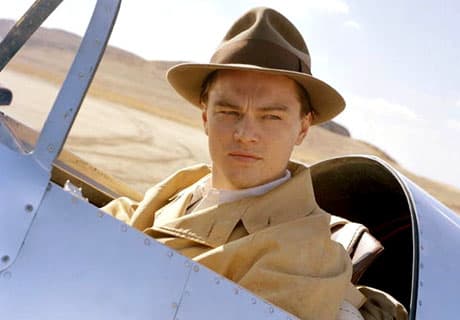When's the last time you've seen The Aviator? Probably during its theatrical release in late 2004/early 2005, when it steamrolled into theatres with the deafening sound of Harvey Weinstein-generated "Oscar buzz." It felt like one of those middlebrow epics that nobody feels much passion for but bullies its way to ten or 12 Oscar nominations ― this time with the added guilt factor that poor Marty, its great director, had never won an Oscar. Six years later, it has turned up as part of Warner's three-disc Martin Scorsese Collection (which also includes Goodfellas and The Departed) and divorced from its Oscar campaign, this 169-minute spectacle about Hollywood mini-mogul/aviator pioneer Howard Hughes feels both exhaustive and sketchy, personal and impersonal, as if Scorsese felt passionate about the material without really understanding it. Why, for example, was Hughes so intent on making the perfect WWI movie, even if it means three years of filming and untold millions of his own money? Why also was Hughes such an obsessive perfectionist in his aviation business, to the point where we see him labouring over picking just the right steering wheel for the Spruce Goose? The depiction of Hughes as reckless and impulsive seems incongruous with his status as a savvy businessman, and Scorsese never reconciles this incongruity. Why, aside from the obvious reasons, was he compelled to work his way through such a dizzying number of young starlets? Scorsese and screenwriter John Logan do, unfortunately, offer a quick explanation for the obsessive-compulsive disorder that would consume Hughes's life, in the form of a lame "Rosebud" opening scene (repeated at the end) with Hughes's germ-freak mother. Maybe what really caught Scorsese's fancy was the opening hour, set in a version of '20s and '30s Hollywood so aggressively glamorous it feels like a Tinseltown wax museum. It's such a fan boy's perception of Hollywood that Scorsese reminds me of Henry Hill, the antihero of Goodfellas, who as far back as he could remember always wanted to be a gangster. Much like Henry Hill, Scorsese is fantasizing about a world he isn't a part of, but deeply wants to be. As for The Departed, you already know that it's a terrific genre film that improves upon its source material, the Hong Kong thriller Infernal Affairs. But consider: Taxi Driver showed us the frightening thoughts and actions we are capable of in extreme isolation; Raging Bull showed how a man's self-loathing and sexual insecurity ruined his life; and The King of Comedy showed the lengths to which we will go to encounter fame and the way the media constructs how we live our lives. The Departed is certainly among Scorsese's most purely entertaining films, but is also one of his only movies that's firmly driven by plot and genre, not character and emotion, never challenging our identities and moral compasses like his earlier work, which forced us to see ourselves in hideous characters like Travis Bickle, Jake La Motta and Rupert Pupkin. I say this not to criticize The Departed, which has completely different ambitions, but simply to point out how interesting it is that it was the one that finally got Scorsese an Oscar.
(Warner)The Martin Scorsese Collection [Blu-Ray]
Martin Scorsese

BY Will SloanPublished Nov 11, 2010